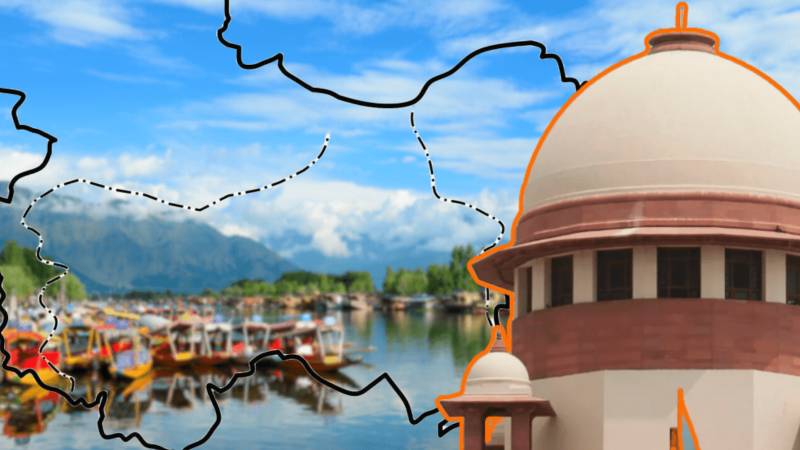
The December 11 decision of the Indian Supreme Court, declaring the abrogation of Article 370 of the Indian constitution as valid, makes a mockery of the constitution and international law. It makes the Indian Supreme Court subservient to the executive branch of the Indian government.
This legal subterfuge, however, can neither change ‘law’ nor can it stop the Kashmiris from demanding freedom for Jammu and Kashmir. The judicial endorsement of India’s unilateral and illegal actions of August 5, 2019, is nothing but a travesty of the Indian constitution and justice. It carries no legal significance and value.
Removing the ‘special status’ of Indian-held Kashmir through a rushed presidential order had already diluted India’s reputation for constitutionalism, democracy and respect for international law. The decision of the Indian Supreme Court now has eroded its integrity and independence.
Presidential Order (C.O. 272) removed Article 370 from the Indian constitution, bifurcating the state into two union territories, namely Jammu and Kashmir (with a legislature) and Ladakh (without a legislature), while allowing a new wave of Hindu settlers to alter the demographic shape of Muslim-majority Kashmir.
Article 370 was enacted so that, whenever necessary, the president of India could apply the Indian constitution to the state of Jammu and Kashmir with the consultation [370(1)(b)(1)] or concurrence [370(1)(b)(2)] of the State. Essentially, Article 370 envisaged a distribution of power between the union and the state of Jammu and Kashmir. Under this constitutional arrangement, matters of national importance (foreign affairs, defence, and communications) remained with the union while all other matters were left to the state. Consequently, the president could bring the provisions of India’s constitution to bear on Jammu and Kashmir, where a uniform policy was desirable, with the ‘concurrence’ of the state.
In effect, the president’s order amounts to a scam on democracy, a fraud on the Indian constitution, and an affront to the people of Jammu and Kashmir. It also offends the UN Security Council Resolution of 1948, which mandates a plebiscite in Jammu and Kashmir to decide the contested status of the state
Article 370 (3) authorises the president to pass an order removing or modifying parts of Article 370. A proviso to Clause 3, however, states that the recommendation of ‘the Constituent Assembly of the State’ … shall be necessary before the president issues such a notification (order). The constituent assembly of the state of Jammu and Kashmir ceased functioning in 1957. In fact, the elected legislative assembly of the state was dissolved in November 2018, after the BJP withdrew from its state-level ruling coalition with a Kashmiri party, known as the People’s Democratic Party (PDP), led by Mehbooba Mufti, in June 2018, and the president’s rule was imposed in December 2018.
As such, we are left to understand that India’s president simply consulted with himself (acting as governor of the state) to issue the disputed presidential order. This might suggest that the dissolution of Jammu and Kashmir’s elected legislative assembly by a BJP-controlled central government and, then, the imposition of the president’s rule was coloured by mala fide intentions.
President’s rule may be imposed in a state when the constitutional machinery of that state breaks down. The president’s rule continues until the elected government is restored. Decisions of a permanent character, such as changing the ‘special status’ of a state itself, without the ‘concurrence’ of the state’s elected legislative assembly, was/is inherently flawed and unconstitutional.
With respect to fundamental constitutional changes requiring the ‘concurrence’ of the state, a governor acting for the central government cannot substitute for an elected state-level government. The Indian constitution does not allow variations in the territory of a state without the ‘concurrence’ of the elected state assembly.
In effect, the president’s order amounts to a scam on democracy, a fraud on the Indian constitution, and an affront to the people of Jammu and Kashmir. It also offends the UN Security Council Resolution of 1948, which mandates a plebiscite in Jammu and Kashmir to decide the contested status of the state.
The International Commission of Jurists (ICJ) said, “The Indian government’s revocation of the autonomy and special status of Jammu and Kashmir violates the rights of representation and participation guaranteed to the people under the Indian constitution and in international law”, calling the president’s order “a blow to the rule of law and human rights in the state and in India”.
With this background, the Indian Supreme Court was confronted with a question of profound importance for democracy in India and around the world: can a head of state 'consult' [Article 370(1)(b)(1)] and 'concur' [370 (1) (b) (2)] with himself to amend a country’s constitution? All eyes were focused on the wisdom of India’s Supreme Court. It was expected from the court to play an independent role and set aside the presidential order saying that State elections are necessary before 'consultation' and 'concurrence' with an (elected) State government can be said to have taken place.
An independent court would have upheld constitutionalism and protected the ‘special status’ of Kashmir against the might of the BJP government. However, while upholding the presidential order, the court has succumbed to the fascist Hindutva ideology and has violated India’s constitution. It has blatantly failed to recognise even the internationally-recognised disputed status of the Jammu and Kashmir.
Any political and legal manoeuvring by India, however, cannot deny the inherent right to self-determination to the Kashmiri people that is protected under international law and the relevant UN Security Council Resolutions. The verdict of the Indian Supreme Court shall be remembered as a decision of a compromised court.

